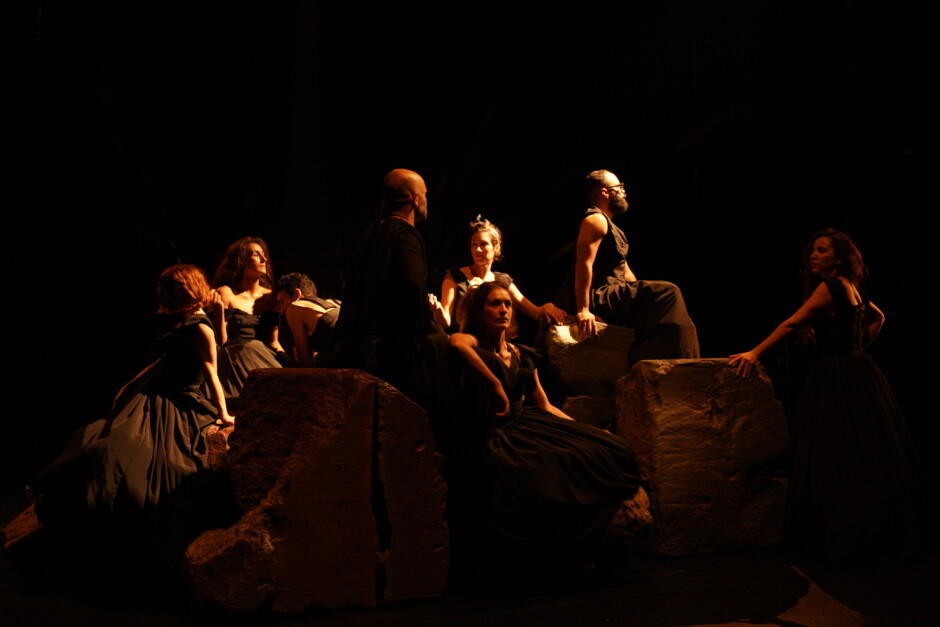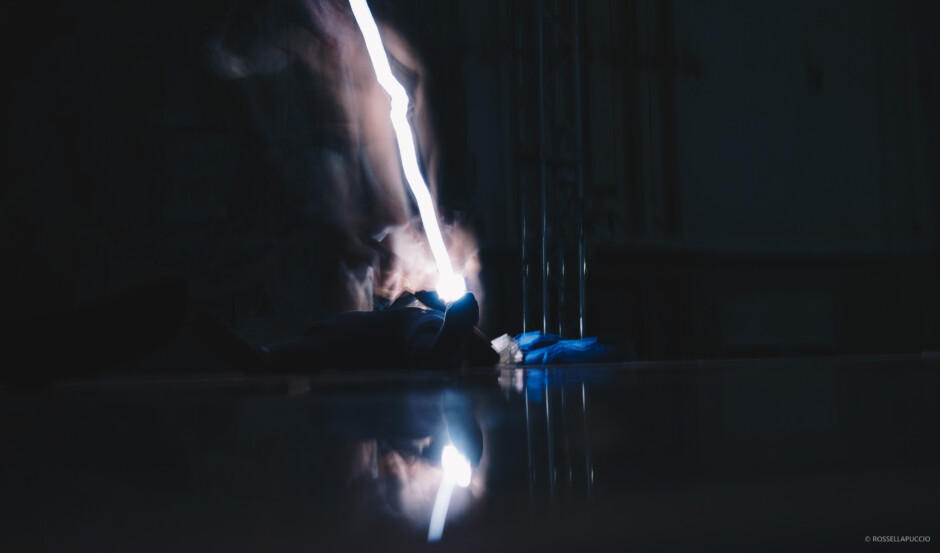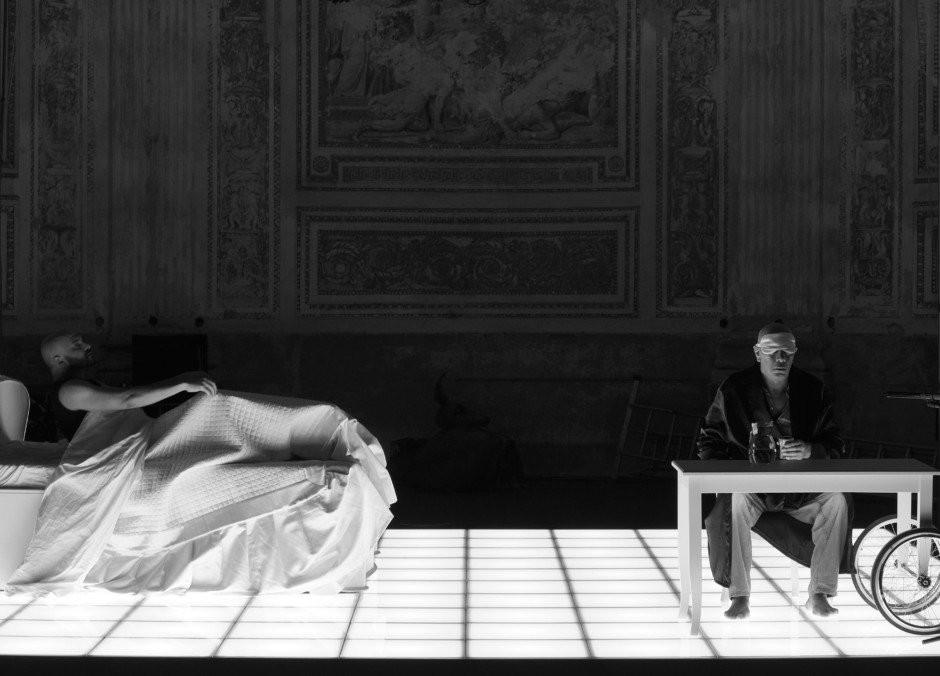جالجبل EL di Simone Mannino: un cast internazionale per una performance multilingue tra terra e mare

«El Jbal» de Simone Mannino au Rio : L’Utopie revisité par le théâtre méditerranéen

Par Salem Trabelsi
Publié sur 25/10/2023 – La Presse
A travers l’histoire de «El Jbal» se dessine un rêve utopique d’un monde multiethnique et multiculturel sans guerres à la recherche d’un Dieu unique.
«El Jbal» (La montagne) est une pièce produite par Ciné-Théâtre Le Rio, Atelier Nostra Signora et l’Ensemble théâtral méditerranéen avec le soutien de l’institut de culture italien à Tunis. La pièce «El Jbal», qui a fait sa première mondiale, samedi dernier, et a été présentée le lendemain à l’espace Ciné-Théâtre Le Rio, a réuni des acteurs (et actrices) tunisiens et italiens. Trois langues sont par ailleurs utilisées dans cette œuvre ; l’italien, le français et le dialecte tunisien. La pièce met en scène un personnage oublié par l’histoire, une sorte d’homme mythique, un Dieu antique ni homme ni femme capable d’aimer au-delà des limites du possible et de régner pendant trois ans sans guerres ni assassinats.
“Prometheus” al Festival di Hammamet: il regista palermitano Mannino aprirà la prestigiosa kermesse in Tunisia

2023_Portrait de Simone Mannino_photo_Fr Rousseau
Di Rossella Puccio 22/07/2023
Il direttore artistico Hamdi Makhlouf: “Abbiamo scelto di aprire questa 57° edizione con una piece italiana che, in collaborazione con artisti tunisini, supera le frontiere culturali, politiche, letterarie e filosofiche di questo mondo”
Con il motto “Dialogo tra diverse culture, generazioni artistiche e arti dello spettacolo” si avvia la 57° edizione del Festival Internazionale di Hammamet (FIH), tra le più importanti kermesse culturali del Nord Africa, che quest’anno affida eccezionalmente la sua apertura al regista e scenografo siciliano Simone Mannino con la sua opera Prometheus. The blue Kangaroo (Prometeo. Il canguro azzurro), coproduzione italo-tunisina che rivisita in chiave moderna un mito antico largamente rappresentato poiché comune a ogni individuo al di là di geografia e storia poiché richiama archetipi umani universali. “La consuetudine è quella di valorizzare un’opera teatrale tunisina realizzata ad hoc per il festival – spiega Hamdi Makhlouf, direttore artistico del FIH -. Ma, in questa 57a edizione abbiamo scelto di aprirlo con una pièce italiana che, in collaborazione con artisti tunisini, supera le frontiere culturali, politiche, letterarie e filosofiche di questo mondo. Il Festival Internazionale di Hammamet con ben 56 edizioni è un punto di riferimento in Tunisia, simbolo della sua diversità culturale. Fin dalla sua creazione nel 1964 non ha mai smesso di sorprendere con una programmazione audace ed eventi straordinari. “Prometeo” è una tragedia in cui Simone Mannino vede l’attualità di questo mondo ingiusto e denuncia, tra le altre cose, le pratiche ambientali di un essere umano cinico.
Festival de Hammamet: Prométhée, le voleur du feu ou le porteur de lumière!

Par Kamel BOUAOUINA
Le syndrome récurrent de la défection du public ou, plutôt, de l’absence de promotion et de la culture du spectacle, continue de pénaliser artistes et férus de théâtre. Le public n’était pas nombreux hier pour voir la pièce de « Prométhée » , une coproduction tuniso-italienne de Simone Mannino qui a réuni une pléiade d’artistes tunisiens et italiens : Jamel Madani (dans le rôle de Prométhée), ainsi que Aymen Mabrouk, Giorgio Coppone, Mariem Sayeh, Paolo Mannina et Chiara Muscato. Difficile de savoir pour quelles raisons le public boude le Théâtre. Toujours est-il que selon Mariem Sayeh : « Nous avons voulu inviter les hommes de théâtre, les artistes, les associations d’environnement, mais la direction du festival n’a pas voulu alors que cette ouverture soit une fête. La pub manquait. Pourtant nous avons fait le plein aux journées théâtrales de Carthage » dit-elle. En racontant l’histoire de « Prométhée », celui qui a volé le feu aux Dieux pour le donner aux hommes ce qui lui vaudra d’être enchaîné pour l’éternité sur ordre de Zeus, le metteur en scène Simone Mannino a fait le choix d’une pièce à la dimension politique.

TOWARDS A MEDITERRANEAN ENSEMBLE
The dramaturge Eva-Maria Bertschy in conversation with director Simone Mannino and actor Jamel Madani
EMB When we started working on Prometeo, you told me about the idea of founding a Mediterranean ensemble in Palermo. You’ve been on the road a lot as a set designer, artist, director, all over Europe, in Turkey, in Russia, but this would be a project worth committing to in the city where you grew up. You want to build something here. How do you envisage that?
SM When Peter Brook founded the global Ensemble and the Centre international de Re- cherche théâtrale back then, he was in a crisis. He asked himself the question: Why theatre? So he set out on a two-year journey with an ensemble of actors from differ- ent cultures to explore this question and confront new forms of theatre. When they returned from the trip, they had used up all their money. Peter Brook and his wife then travelled to the USA, where they met a millionaire who gave them a few millions. They were thus able to build Le Théâtre des Bouffes du Nord in Paris, in an old theatre à l’italienne that had been empty for years and was totally run down.
That’s about how I imagine it: the search is in the journey and the question is always the same. There are many unused theatres in Palermo that could be suitable. I already have my eye on one, of course. All I need now is to find a millionaire. (He laughs.) The question of financing is central of course. You can’t do anything without money. And in southern Italy, cultural subsidies are less generous than in Germany or France.
JM That’s exactly why you should consider whether you would perhaps prefer to found the Mediterranean ensemble in Tunisia. Tunis would be a good place for it. I’m not say- ing that because I grew up there and love this city. But because in Tunis you can do much more with little money. Everything is much more expensive here and people still earn very little. At the same time, Tunisia is one of the only countries in the Arab region where there is subsidised theatre and the government is actually interested in culture.
EMB Does the Mediterranean Ensemble need a location at all?
SM It doesn’t necessarily need a location. In my mind, however, it is important for it to be lo- cated somewhere. Palermo seems interesting to me because of its geographical loca- tion in the centre of the Mediterranean. And also because Sicily never really belonged to Europe and Tunisia was always closer than the north of Italy. At the centre of the Mediterranean ensemble, however, is not so much a place as an association of artists, i.e. actors from all the countries around the Mediterranean. “A strange sight, to scrape the seabed and see bodies raining down on you. I have seen millions of them, swimming over Tunis, Palermo, Alexandria, Marseille, Algiers, Athens, Beirut, Barcelona, Tel Aviv, Istanbul, Tangier, Tripoli…”, says Prometheus in our play. It is a matter of developing a common theatrical language, and perhaps even a Mediterranean theatrical circuit.
EMB We took a first step with Prometeo by asking actors from Tunisia and Italy to participate.
SM Of course, that brings with it the very pragmatic difficulty that we have to communi- cate in one language in rehearsals. And then there is the question of which language we speak to the audience. We have only become accustomed to watching theatre from other linguistic areas since we started regularly using surtitles in the theatre. In “Prometeo”, the actors speak Italian and Arabic on stage. It wasn’t that complicated to find actors in Tunisia who also speak Italian. Tunisians have a lot more connections to Italy than you might think at first.